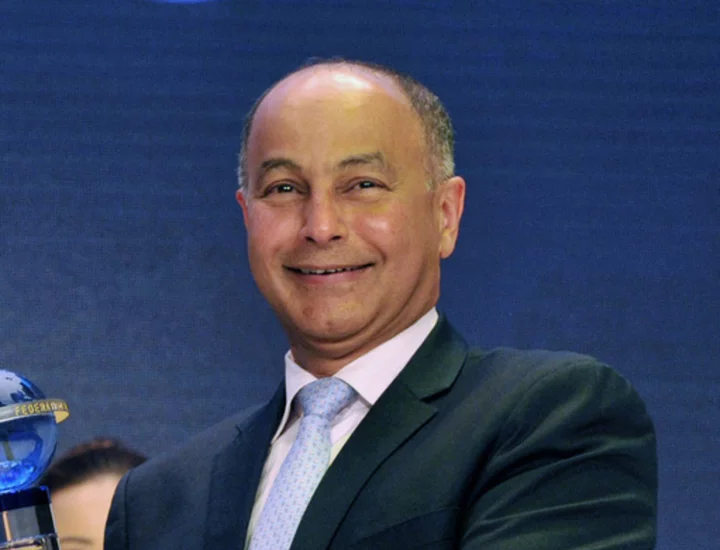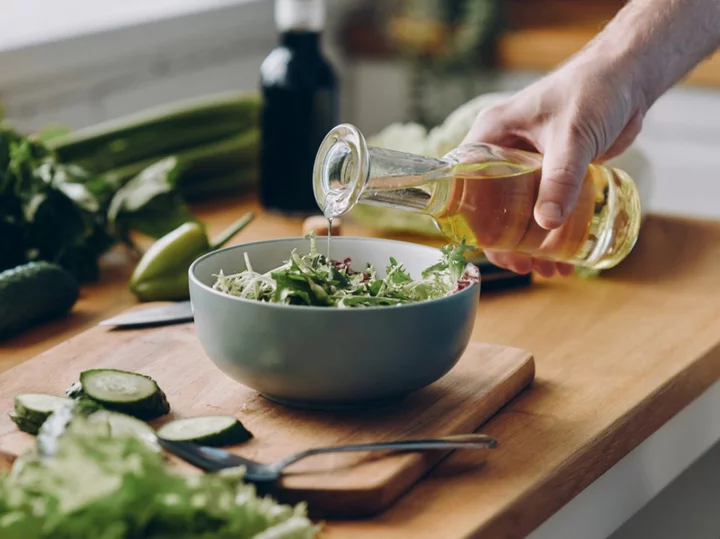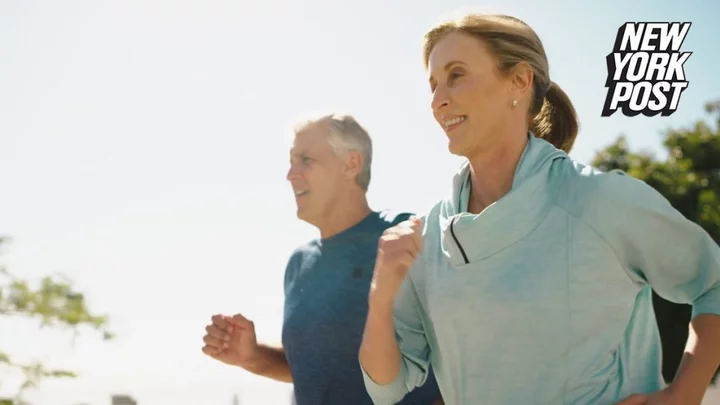
Everything you need to know about using a defibrillator
In a huge step for first aid in the UK, more than 20,000 defibrillators – which are devices that give an electric shock to the heart of a person who is in cardiac arrest – have been delivered to state schools across the country since January. Cardiac arrest can affect anyone, of any age, but according to St John Ambulance research, when a defibrillator is used within the first three minutes of a cardiac arrest, the chances of survival increase by up to 70%. Knowing how a defibrillator works could save someone’s life, but what should you know before using one? What is a defibrillator? “A defibrillator is an electrical device that provides a shot across the heart to help bring people out of cardiac arrest,” explains James McNulty-Ackroyd, head of clinical projects and paramedic at St John Ambulance. They are often labelled as an AED which is “an automated external defibrillator, and it recognises when using one would be beneficial for the patient. When we talk about cardiac arrests, we talk about shockable and non-shockable, and an AED is useful when the heart is in particular shockable rhythms”, he says. When used, the electrical shock stuns the heart to send it back to its normal function “from the right shoulder down to the left armpit”. The AED knows when it should work after the pads have been applied, because it “recognises the rhythm like an ECG automatically, and it will not shock if the heart is not in one of the relevant rhythms”. When should you use one? You only need a defibrillator in an incident of cardiac arrest. “They should only be used when the patient is not breathing normally, or the heart has stopped,” explains McNulty-Ackroyd. “Their breathing may be like a fish out of water, there is no rhythm to it, there is no real air entry, or non-purposeful gasping. “The heart is not pumping in that situation – it is not working, but there is some movement. They need a defibrillator and high-quality CPR (cardiopulmonary resuscitation).” What should you be wary of? The good news is, there’s not much to worry about when using one. “Ideally, you should not have anyone touching the patient when you press the big red button, but there are lots of different devices on the market and most have written and audible instructions, and tell you what to do, so it will say to stand clear and tell you what to press and when,” he explains. You need to take or cut the person’s shirt off, though. “There is quite a lot of disinformation about taking someone’s bra off. If you do not take their bra off, you cannot get the pads in the right place. Cut down the middle of the bra, and let it fall open.” What do you actually do? So, you have seen someone go into cardiac arrest or found someone who has collapsed. What do you do? “If you find someone who you think is in cardiac arrest, start CPR, shout for someone to bring you a defibrillator, and ask them to call for help,” advises McNulty-Ackroyd. “The first thing the ambulance service will ask is, ‘Are they breathing?’ They will ask if they’re awake and you will say ‘no’, as they are in cardiac arrest. “An ambulance will be sent as the highest priority in that area. In the meantime, you should be using an AED and performing CPR. “When you ring 999, they will tell you how to do CPR. Do not worry about hurting someone you are doing CPR on. That person is dead, they cannot feel pain, if they sit up and go ouch, they are not in cardiac arrest.” When using the defibrillator, “the first pad goes on the upper right, touching the clavicle [bone of the pectoral arch], and the other into the left armpit, nice and high”, he explains. Every minute you don’t shock that abnormal rhythm, the person loses a chance of life, so use a defibrillator and perform CPR if you are in any way worried about someone who has collapsed. Read More Charity boss speaks out over ‘traumatic’ encounter with royal aide Ukraine war’s heaviest fight rages in east - follow live What you need to know about the massive LVMH deal with the Paris Olympics Bisexual people ‘experience worse health than other adults’ What’s the coolest bedding to survive summer heat and night sweats?
2023-07-25 20:54

Transgender swimmers to be included in the trial of an open category at competitions
The governing body of swimming says it will set up an “open category” that will include transgender competitors
2023-07-25 20:48

Venice Film Festival unveils A-list lineup with ‘Priscilla,’ ‘Ferrari,’ ‘Maestro’ amid strikes
Bradley Cooper’s Leonard Bernstein drama “Maestro,” Sofia Coppola’s Priscilla Presley movie, Michael Mann’s “Ferrari,” David Fincher’s “The Killer” and Ava DuVernay’s “Origin” will be making their world debuts at the Venice International Film Festival this fall
2023-07-25 20:46

Model hits back at ‘weirdos’ claiming her body is ‘fake’
Runway model Marissa Dubois has hit out at critics who suggested she has had plastic surgery to achieve her body shape. The Miami-based model and content creator went viral over the weekend after a video of her walking the runway for retailer Hot Miami Styles resurfaced on social media. A clip of Dubois strutting down the runway was shared on the Daily Loud Twitter account, prompting thousands of comments – both positive and negative. While many complimented Dubois for her modelling, others claimed that parts of her body were “fake” and “unnatural”, with some accusing her of undergoing plastic surgery. The model addressed the claims by sharing a throwback photo from her high school days, holding up a sign during her senior year. In the photo, a young Dubois smiles at the camera whole holding a colourful sign with the words “Big Judy” framing a curvy behind in jeans. She wrote in the caption: “For the weirdos that somehow think my body’s fake… This was my senior sign in [high school].” Fans showed their support for Dubois’ clapback with messages of support in the comments. “It’s always smart to keep receipts but in this case, let the haters hate. You don’t have to prove anything to anyone!” one person wrote. “Keep on blessing that runway (as well as us all) and continue reaching for and achieving all of your hopes and dreams.” Another added: “That’s why you got that zest in your walk, doctors can’t give anybody that.” A third said: “You don’t owe anyone any explanation. You are beautiful.” Dubois also received negative criticism about her curvy figure after trolls claimed she was “overweight”. However, fans also came to her defence and praised body diversity on the runway. “A lot of the comments make no sense. I see a beautiful curvy woman owning it,” one person said. Another declared: “Glad we’re finally evolving to have different women with different body shapes modelling.” Dubois’ appearance on the runway is refreshing for many viewers, particularly since the fashion industry came under fire this year for reducing the number of diverse models on the catwalk compared to previous years. Edward Enninful, former editor-in-chief at British Vogue, spoke out against the lack of diversity in March after Fashion Month. Sharing the April 2023 cover of the magazine, which included models Paloma Elsesser, Precious Lee and Jilla Kortleve, Enninful wrote on social media that he felt like he “had gotten into a time machine” while attending shows during Fashion Month. “Show after show dominated by one body type, so many limited versions of womanhood, it felt like we were slipping back,” he said. “From runways in Milan and New York, to the red carpets of the recent awards season, we all saw it happen: one prescribed notion of beauty prevailed again, and it felt like the reality of so many women around the world were being ignored.” Enninful recently stepped down from his role as editor-in-chief and will take on a new title at Condé Nast as global creative and cultural advisor of Vogue. Read More My Taylor Swift exercise class has led me down a luxury fitness rabbit hole Husband fired from family business after wife roleplayed with reborn dolls The bowel cancer symptom George Alagiah wished he’d caught earlier What you need to know about the massive LVMH deal with the Paris Olympics 6 of the biggest bridesmaid fashion trends to know about Barbie fans roast Ben Shapiro for complaining about movie ‘while dressed as Ken’
2023-07-25 20:24

Mexico's native ethnic groups promote their heritage during Oaxaca’s biggest cultural festival
The festival of Guelaguetza – the biggest cultural event in southwestern Mexico – showcases the traditions of 16 Indigenous ethnic groups and the Afro-Mexican community
2023-07-25 20:15

Epicenter of Europe’s Heat Wave Shifts to Fire-Ravaged Greece
The epicenter of Europe’s heat wave is shifting back to fire-ravaged Greece, as temperatures are set to hit
2023-07-25 19:47

What you need to know about the massive LVMH deal with the Paris Olympics
The LVMH group has announced a significant partnership with the 2024 Olympic and Paralympic Games in Paris. The luxury goods conglomerate – which owns brands including Louis Vuitton, Fendi, Tiffany & Co, Moët & Chandon, Hennessy and Dom Perignon – unveiled the news one year ahead of the XXXIII Summer Olympics, set to begin on July 26, 2024. The partnership will include providing products for Olympic events, crafting medals and sponsoring athletes. “It was only natural that LVMH and its maisons be part of this exceptional international event,” said Bernard Arnault, chairman and CEO of LVMH. “Sport is a tremendous source of inspiration for our maisons, which will unite creative excellence and athletic performance by contributing their savoir-faire and bold innovation to this extraordinary celebration.” The first athlete to receive LVMH sponsorship is swimmer Léon Marchand. A strong medal contender for France, the 21-year-old has won three world champion titles and is the world record-holder of the 400-metre individual medley. Make-up brand Sephora will be a partner for the Olympic Torch Relay, while Moët Hennessy wines and the LVMH spirit brands will provide beverages for the Games’ hospitality program. Parisian jeweller Chaumet will design the Olympic and Paralympic medals, and luxury fashion labels Louis Vuitton, Dior and Berluti will lend their expertise in the run-up to the event. LVMH has also committed to expanding its charitable efforts, starting with an initiative with longstanding non-profit partner Secours Populaire Francais. The scheme will facilitate access to sports for 1,000 children and young people aged four to 25 who live in vulnerable situations via funding for sports association memberships, training programs and beginner classes. “LVMH already supported us during our bid for the Summer Olympics and we are thrilled to have the Group with us 100% for this exciting adventure,” said Tony Estanguet, president of the Paris 2024 Olympic Committee. “With its exceptional know-how, the LVMH Group will bring its immensely creative talent to this project and enable us to benefit from its extensive experience.” LVMH jewellers and leather goods brands have a long history of creating trophies and travel cases for major sporting competitions. The Super Bowl and US Open trophies are created by Tiffany & Co, while the leather trunks that house the World Cup, NBA Championship and Monaco Grand Prix trophies are all made by Louis Vuitton. Read More Charity boss speaks out over ‘traumatic’ encounter with royal aide Ukraine war’s heaviest fight rages in east - follow live Bisexual people ‘experience worse health than other adults’ What’s the coolest bedding to survive summer heat and night sweats? How to bring a touch of the Mediterranean to your garden
2023-07-25 18:58

Scientists share the 8 habits that impact your lifespan the most
Scientists have identified eight unhealthy lifestyle choices which, if changed, could see people live more than 20 years longer. Lack of exercise, opioid use and smoking have the biggest negative impact on lifespan and can lead to a 30-45 per cent higher risk of death, according to the study. Stress, binge drinking, poor diet, and poor sleep hygiene were each associated with around a 20 per cent increase in the risk of death. And a lack of positive social relationships was the eighth habit mentioned and is associated with a 5 per cent increased risk of dying. Meanwhile, a separate study suggests incorporating olive oil into your diet could help reduce the risk of dying from dementia. Consuming more than half a tablespoon of olive oil per day is linked to a 28 per cent lower risk of dying from the condition, compared with those who never or rarely eat the oil, researchers say. The findings from both studies were presented at Nutrition 2023, the annual meeting of the American Society for Nutrition being held in Boston, and may include more up-to-date figures than the data initially submitted for the meeting. The research that looked at lifestyle habits used data from medical records and questionnaires collected between 2011-2019 from 719,147 people enrolled in the Veterans Affairs Million Veteran Program. It found that men who have all eight healthy habits - including high physical activity and not smoking - at age 40 would be predicted to live an average of 24 years longer than men with none of these habits, and for women an additional 21 years. Xuan-Mai Nguyen, health science specialist at the Department of Veterans Affairs and rising fourth-year medical student at Carle Illinois College of Medicine, USA, said: “We were really surprised by just how much could be gained with the adoption of one, two, three, or all eight lifestyle factors. “Our research findings suggest that adopting a healthy lifestyle is important for both public health and personal wellness. “The earlier the better, but even if you only make a small change in your 40s, 50s, or 60s, it still is beneficial.” The researchers say their findings, which have not been peer-reviewed, highlight the role of lifestyle factors in contributing to chronic diseases such as type 2 diabetes and heart disease that lead to premature disability and death. In the olive oil study, scientists analysed dietary questionnaires and death records collected from more than 90,000 Americans over three decades, during which 4,749 people died from dementia. It also found that replacing just one teaspoon of margarine and mayonnaise with the equivalent amount of olive oil per day was associated with around an eight to 14 per cent lower risk of dying from dementia. Anne-Julie Tessier, a postdoctoral fellow at the Harvard TH Chan School of Public Health in the USA, said: “Our study reinforces dietary guidelines recommending vegetable oils such as olive oil and suggests that these recommendations not only support heart health but potentially brain health, as well. “Opting for olive oil, a natural product, instead of fats such as margarine and commercial mayonnaise is a safe choice and may reduce the risk of fatal dementia.” Research suggests that people who regularly use olive oil instead of processed or animal fats tend to have healthier diets overall. However, Dr Tessier noted that the relationship between olive oil and the risk of dying from dementia in this study was independent of overall diet quality. She added that the research is observational and does not prove olive oil is the cause of the reduced risk of fatal dementia. However, Professor David Curtis, UCL, said it was difficult to assess whether the research adds much to the understanding of links between diet, health and dementia risk, as it has not been peer-reviewed. He added: “There are many, many differences between people who consume olive oil and those who do not and it is never possible to fully account for all possible confounding factors. “Another point to bear in mind is that about half of dementia is caused by vascular disease so that anything which improved cardiovascular health, such as not smoking, would be expected to reduce dementia risk. “It has been shown that olive oil consumption is associated with better cardiovascular health so one would expect that it would also be associated with lower dementia risk.” Dr Duane Mellor, registered dietitian and senior lecturer at Aston University, said: “The authors claim replacing margarine and mayonnaise with olive oil could reduce risk. “However, many people who did this would also change the food that it is being added to, which could increase vegetable, lentils, beans, peas, seeds and nut intake – all of which are linked to a healthy diet and reduced risk of conditions like dementia. “We also need to remember that it is not just what we eat that helps maintain our brain function, it is how we eat – and remaining sociable around meal times and eating with others can benefit our mental health in the short term and cognitive function as we age.” Read More The bowel cancer symptom George Alagiah wished he’d caught earlier Experts share 8 healthy habits to help you live longer Husband fired from family business after wife roleplayed with reborn dolls Cara Delevingne says her journey to sobriety has been worth ‘every second/ Bisexual people ‘experience worse health than other adults’ The bowel cancer symptom George Alagiah wished he’d caught earlier
2023-07-25 18:50

Late night snacking could increase risk of diabetes and heart disease, study says
Eating a snack late at night carries significantly more negative health implications compared to snacking during the day, a new study has found. According to researchers at King’s College London, people who eat most of their snacks in the evening after 9pm saw larger spikes in their blood sugar compared to those snacked earlier in the day. The group who snacked later also had higher concentrations of fat in their blood compared to those who snacked earlier. The researchers studied data from 1,000 people who took part in the Zoe Predict study. The participants kept a food diary and wore blood sugar monitors in order to keep track of the impact of snacking. On average, they ate two snacks a day, with one in three “late evening snackers” eating most of their snacks after 9pm instead of between meals. High blood sugar and fat can lead to diabetes and heart disease, studies have found. People with diabetes are also more likely to have other conditions that raise the risk of heart disease, such as high blood pressure. The Zoe Predict project is a group of in-depth nutritional research studies that aim to reveal how and why people respond differently to the same foods. Kate Bermingham, a postdoctoral fellow at King’s College London and lead author of the study, said: “Surprisingly little has been published on snacking, despite the fact that it accounts for 20 to 25 per cent of energy intake. “Predict followed a large number of people and captured detailed information on their snacking behaviours, allowing this in-depth exploration of snacking on health.” Researchers analysed the relationship between the number of snacks participants ate, the quality of the snacks and the timing with blood fats and insulin levels. Snacking on higher quality foods, which are described as foods that contain significant amounts of nutrients relative to the calories contained, was associated with better bodily responses. The study concluded that the most important factor in determining the body’s response is the quality of snacks, not how often or how much they are consumed. Foods like fruit or vegetables resulted in a better blood fat and insulin response compared to processed foods, such as biscuits and cake. Bermingham added: “Our study showed that the quality of snacking is more important than the quantity or frequency of snacking, thus choosing high quality snacks over the highly processed snacks is likely beneficial. “Timing is also important, with late night snacking being unfavourable for health. This may mean that, universally, snacking late in the evening and interrupting the overnight fasting window is detrimental to health.” The study was presented at a meeting of the American Society for Nutrition. Read More My Taylor Swift exercise class has led me down a luxury fitness rabbit hole Husband fired from family business after wife roleplayed with reborn dolls MrBeast YouTuber Kris Tyson comes out as transgender: ‘I’m excited to authentically be myself’ Scientists share the 8 habits that impact your lifespan the most Cara Delevingne says her journey to sobriety has been worth ‘every second/ Bisexual people ‘experience worse health than other adults’
2023-07-25 18:50

GE Lifts Outlook on Surging Aerospace Demand, Renewables Rebound
General Electric Co. raised its full-year guidance and reported second-quarter results that blew past Wall Street’s expectations as
2023-07-25 18:49

Spotify Users Top Expectations Thanks to Gen Z Listeners
Spotify Technology SA, the Swedish audio streaming platform, beat analyst expectations in its second-quarter results with its total
2023-07-25 18:26

Experts say introduce these eight changes to extend your life
Eight simple lifestyle changes could add more than 20 years to your life, research suggests. According to a study, presented at the annual meeting of the American Society for Nutrition in Boston, making minor changes even if you are already middle aged could pay massive dividends when it comes to extending your life. “Our research findings suggest that adopting a healthy lifestyle is important for both public health and personal wellness,” said Xuan-Mai T Nguyen, a health science specialist involved in the work at the US Department of Veteran Affairs. “The earlier the better, but even if you only make a small change in your 40s, 50s, or 60s, it still is beneficial,” she added. So what are the lifestyle changes? Sign up to our free Indy100 weekly newsletter They are: Eat well. Avoid cigarettes. Get a good night’s sleep. Be physically active. Manage stress. Avoid binge drinking. Be free from opioid addiction. Have positive social relationships. Who knew stopping smoking was so good for you?... The research drew on data from questionnaires and medical records collected between 2011 and 2019. The records covered more than 700,000 US veterans aged from 40 to 99 who were enrolled in the Veterans Affairs’ Million Veteran Program. “Men and women who adopted eight therapeutic lifestyle factors could gain 23.7 or 22.6 years of life expectancy, respectively, at age 40 years compared to those with no adopted lifestyle factors,” the authors write. However, as the study was done through observation, the work cannot prove a causal link between the factors identified and differences in lifespan. Have your say in our news democracy. Click the upvote icon at the top of the page to help raise this article through the indy100 rankings.
2023-07-25 17:29
